The Importance of Being Ernest Part III: Ernest Goes to Jail (1990)
In which we learn that Disney insisted that Ernest P. Worrell not have a penis or sexual urges.
The character of Ernest P. Worrell, lovable denim-clad goober, wasn’t just commercial in the sense of appealing to a broad mainstream audience. He was also commercial in that he was specifically created by the Nashville-based Carden & Cherry Advertising Agency to sell products.
When it came to selling people crap they don’t need, Jim Varney proved a savant. The rubber-faced, elastic-limbed comic genius and hero to children everywhere had a photographic memory that allowed him to memorize scripts almost instantly and crank out dozens of versions of a spot over the course of a single day.
Ernest was a creature of commerce. He was a pure pitchman spawned at the dawn of the Reagan decade to sell a wide variety of products, goods and services on both the local and national level.
Jim Varney refined and perfected the character of Ernest P. Worrell during his early days as a prolific, popular and in-demand pitchman. By the time Ernest made his starring debut in 1987’s Ernest Goes to Camp Varney had been playing the trash icon for seven years.
He had attained mastery. He was a physical comedy virtuoso equally adept at lightning-fast, dazzlingly precise verbal humor.
That’s one of the many things that I find fascinating about Varney’s portrayal of Ernest P. Worrell. He’s understandably seen primarily as a sturdy vessel for slapstick shenanigans but he’s also blessed with a seemingly incongruous streak of verbosity and grandiosity.
Ernest P. Worrell is a quintessential small guy with big dreams. In 1990’s Ernest Goes to Jail, the ambitious janitor proudly proclaims, with a look of furious determination, “I am Ernest P. Worrell, an upwardly mobile American at his best. And I know that if I pay my taxes, bathe and floss regularly, I will ascend the ladder of success, head over foot.”
For the pratfall-prone working man, ascending the ladder of success means getting a white-collar job as a clerk at the bank he cleans. In American movies it’s okay be to working class only if you’re aggressively and publicly striving to be more successful.
Ernest does not let the fact that he is uniquely inept at his job keep him from dreaming of something more. While cleaning the bank one fateful day the floor polisher Ernest is using goes haywire in ways generally not seen outside of Saturday morning cartoons.
The metal monstrosity seemingly gains sentience and takes on a life of its own. It’s so preposterously powerful that it upends the law of gravity and pulls Ernest across the floor and up a wall to the ceiling.
An overwhelmed and unbelieving Ernest yells at the floor polisher, “You can’t go up walls!” as it proceeds to do just that.
It’s as if Ernest is heckling his own movie by explicitly singling out one of the many moments when it leaves the dreary world as we know it and enters a crazy realm of cartoon fantasy where anything is possible and the laws of God and man no longer apply.
At the risk of hyperbole, the set-piece where Ernest’s floor polisher goes crazy, destroys the bank and zooms up a wall in violent defiance of everything we know about physics and gravity is a masterpiece of physical comedy on par with the best of Charlie Chaplin and Jaques Tati.
Ernest Goes to Jail briefly turns into Maximum Overdrive as machines and inanimate objects seemingly come to life in order to terrorize Ernest. But they also give him incredible, incredibly poorly defined powers.
From that moment on Ernest P. Worrell, incompetent janitor and aspiring bank clerk, has a unique and unpredictable relationship with magnets and electricity that changes constantly according to the needs of the plot.
This causes problems on Ernest’s non-date date with bank employee Charlotte Sparrow, a coworker he has a crush on. Ernest’s love interest here is played by an actress named Barbara Bush.
Yes, Barbara Bush. When Ernest Goes to Camp was released in 1990 the First Lady was also named Barbara Bush, but that somehow did not keep the actress from changing her name until later in her career.
That would be like watching a new movie with a leading lady named Jill Biden, Michelle Obama or Melania Trump: distracting!
As its title suggests, Ernest Goes to Jail is ultimately not a movie about a hillbilly who wants to be a bank clerk or a lowbrow romp about a redneck goober who becomes a human magnet when narratively convenient.
Ernest Goes to Jail is instead a story about Ernest going to the big house and a violent criminal escaping certain death. Ernest happens to be a dead ringer for Felix Nash (Varney in a challenging double role), a violent career criminal sentenced to death by electrocution for his crimes against humanity.
When the glowering career criminal’s flunky Rubin Bartlett (Barry Scott) goes on trial for murdering a fellow inmate Ernest ends up serving as a juror for the trial. That is one heck of a coincidence but then Ernest Goes to Jail has no use for realism, plausibility or verisimilitude. It’s a live-action cartoon with a goofy anti-logic all its own.
Rubin decides to take advantage of Ernest’s uncanny, some might even say wildly implausible resemblance to Felix Nash to spring him from prison. In yet another unrealistic development, Rubin’s lawyer convinces the judge to move matters to the prison where the murder took place.
There, an oblivious Ernest is bonked on the head, stripped of his signature attire and dressed up in Felix Nash’s jumpsuit so that the condemned criminal can escape prison in Ernest’s trademark duds and live his life.
Ernest is so oblivious that it takes him a good ten minutes to realize that he is a prisoner in jail and not being sequestered in an unusual hotel.
Jim Varney’s endlessly enthusiastic pop icon is an overgrown, emotionally stunted man-child beloved by children and simple-minded adults like myself.
So it’s striking that Ernest Goes to Jail is a kiddie slapstick comedy completely devoid of children. The setting lends the proceedings an unmistakably adult air, as does Varney’s relatively deadpan, straightforward portrayal of Felix Nash as a murderous sociopath.
After escaping prison and a date with the electric chair, Felix attempts to force himself on Charlotte Sparrow, then proceeds to drop Ernest’s beloved dog Rebound in the trash.
An attempted sexual assault has no place in an Ernest movie, even one set primarily in a prison. Ernest is a fundamentally asexual figure but I previously did not realize just HOW intent his corporate masters were on keeping Ernest from being a magnificent fuck-beast.
The IMDB Trivia for Ernest Goes to Jail contains this fascinating bit of information: “(quasi-love interest) Charlotte Sparrow was originally written to get together with Ernest at the end. Jim Varney and the writers always wanted a love interest for Ernest. Several times he mentions a wife in the early commercials. Disney, however, vetoed the notion of Ernest experiencing any type of romance or love. Disney told the writers, "He's smooth down there". The writers were crushed once they were told that Ernest had no genitalia, they felt it was like finding out there's no Santa.”
While Felix enjoys freedom and plots to rob the bank that foolishly employs his exact double Ernest tries to escape prison through a series of comical ruses, including cross-dressing.
Nothing works, however, and he ends up in the electric chair. The hapless son of the South is electrocuted but instead of killing Ernest the electricity instead gives him super powers. He’s able to control electricity and also fly.
Director John Cherry apparently wanted Ernest to grow to the size of Godzilla in a climax where he squares off against Felix Nash but Disney thought that would be too expensive.
So Ernest instead FUCKING FLIES like some manner of hillbilly Superman. He even blasts off into the stratosphere at one point, seemingly to his death, only to return all charred and burnt to conclusively beat the bad guy.
Ernest Goes to Jail is gloriously surreal in a Hellzapoppin’/Olsen and Johnson way. Ernest builds upon his inspirations, whether in the form of the unmistakably Pee-Wee Herman-style house where our hero lives, which is full of wacky, homemade contraptions and crackpot inventions, or by having Ernest’s boss be named Oscar Pendlesmythe, a tongue-twister of a moniker that Ernest butchers in an enjoyably Jerry Lewis-like fashion.
Ernest Goes to Jail was a sizable hit but Varney’s subsequent vehicles would prove less lucrative and successful. It wouldn’t be long until Ernest’s movies began going direct to video but at the very beginning of his glorious, underrated film career, Varney was sharper and funnier than his reputation as a walking punchline would suggest.


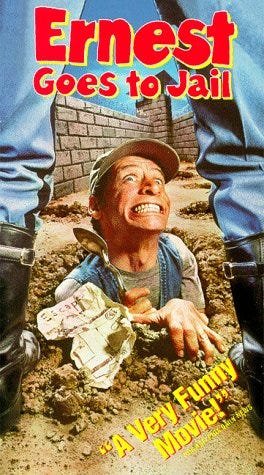

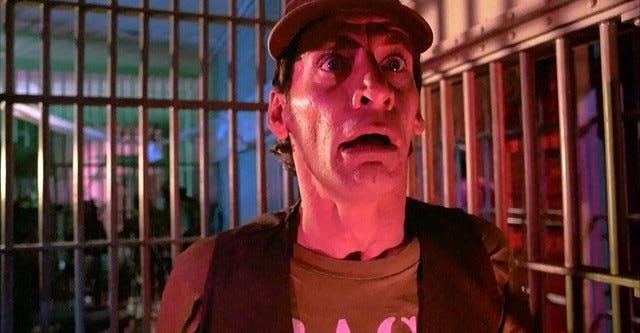
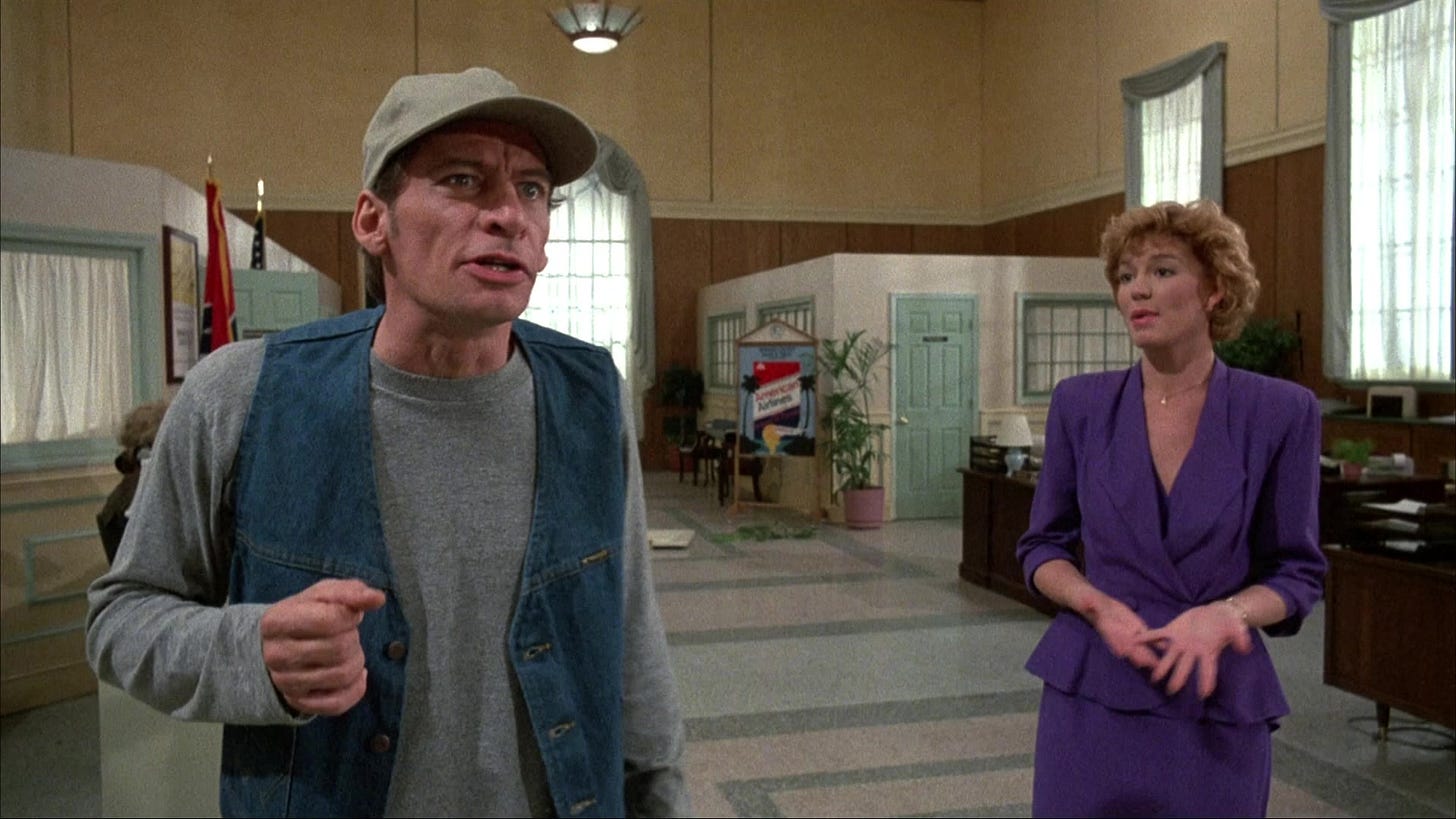
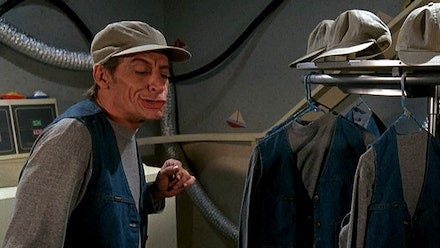
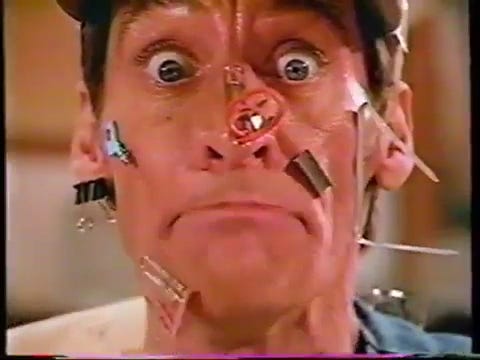
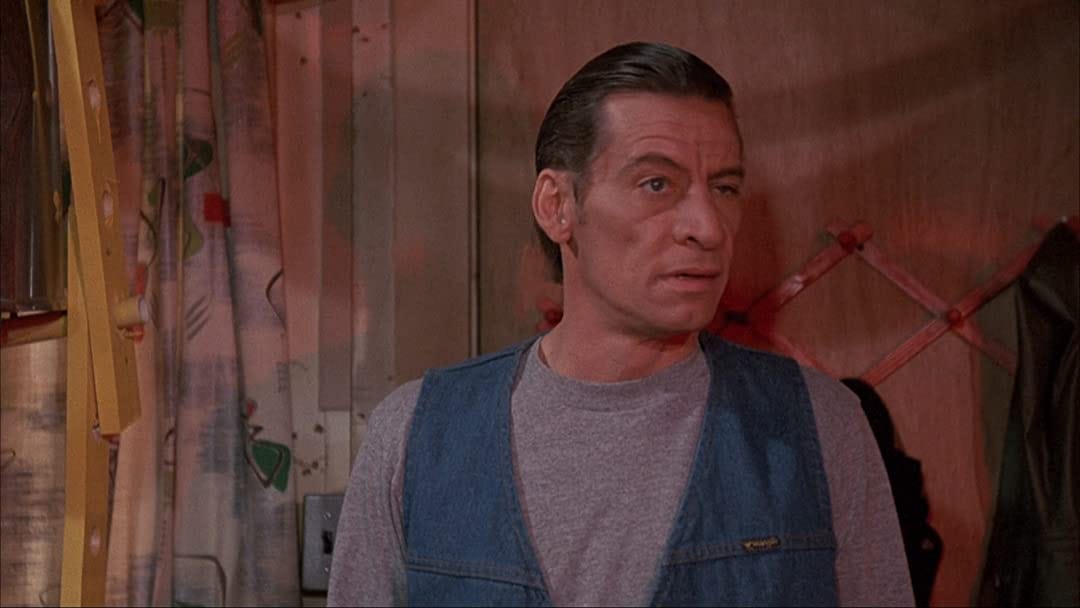

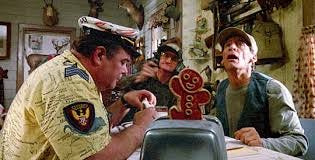
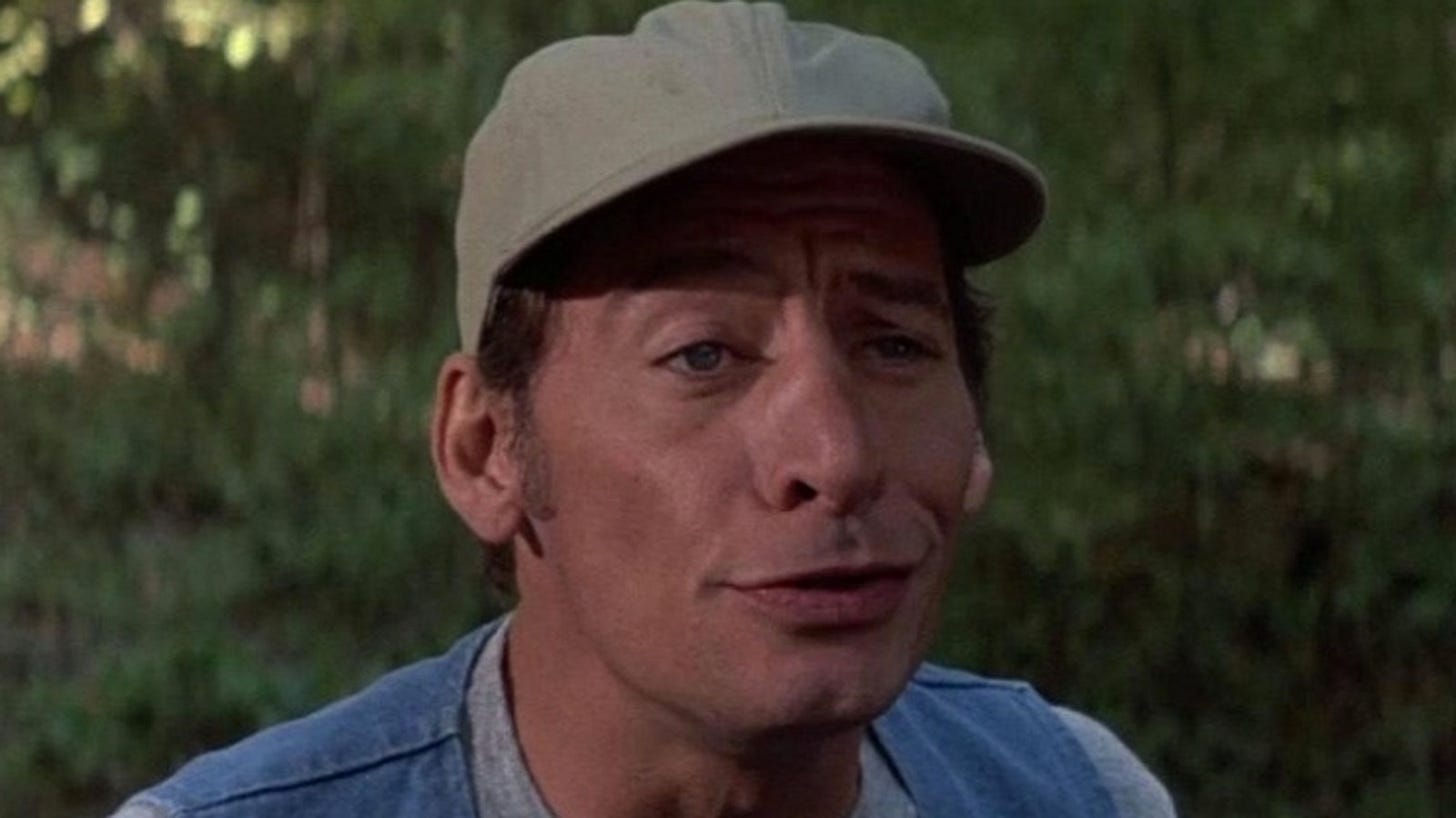
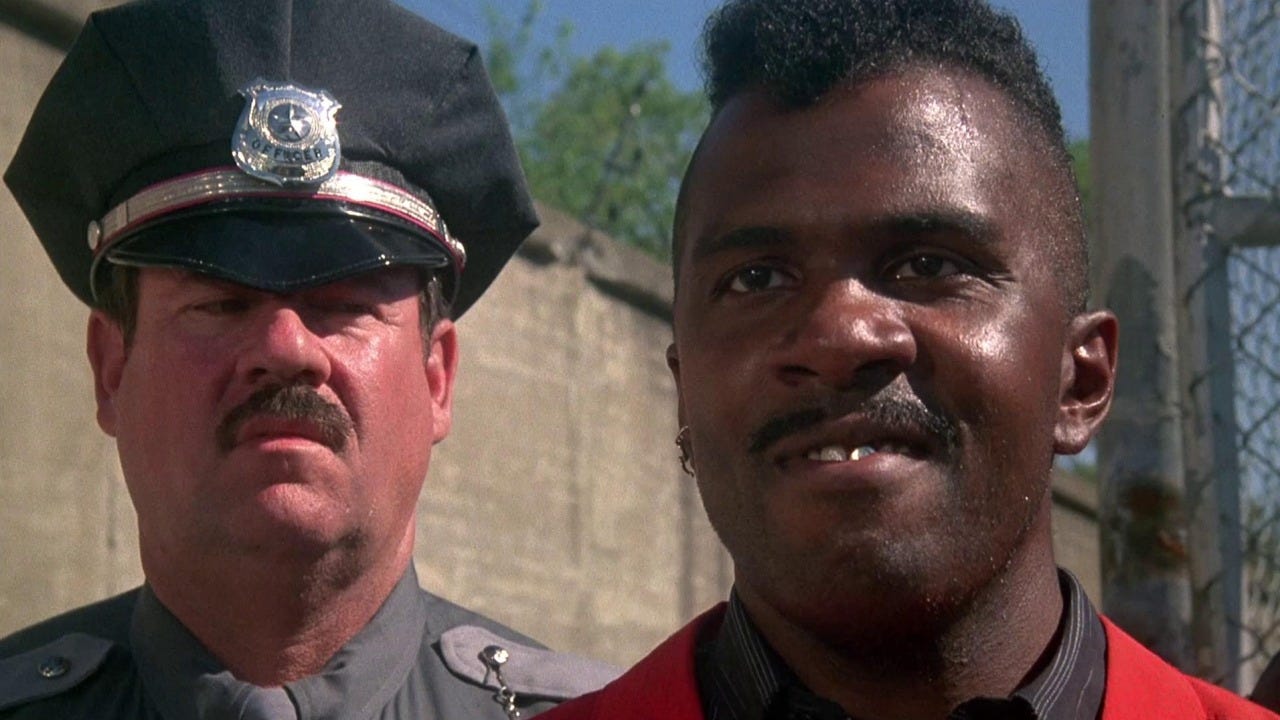
I've been enjoying this series very much. I love how it takes an affectionate look at Varney and his comedic talents while also acknowledging the series' and films' genuine idiocy.
I liked the Disney character Goofy, and the character Ernest. They each have the quality of being both "earnest" and hapless.